Politics
EU-MOLDOVA – Does Moldova repress media freedom or sanction abusive propaganda? (II)

At the end of February 2022, after Russia’s full-scale military invasion of Ukraine, the Moldovan parliament introduced a state of emergency for a period of 60 days. During this period, broadcasting television programs from Russia was limited in the country. In addition, access to the news websites Sputnik Moldova, Eurasia Daily (https://eadaily.com/ru/) and a number of other resources was blocked. The Prosecutor General’s Office of the country announced the launch of an investigation against a number of persons “on suspicion of biased coverage of events happening in Ukraine”.
By Dr Evgeniya Gidulianova with Willy Fautré (See Part I HERE)
Timeline of the Moldovan sanctions
On 2 June 2022, the Moldovan parliament adopted a package of legislative amendments related to the country’s information security. The Code on Audiovisual Media Services was amended to prohibit the retransmission of news, television and radio programs with informational and analytical, military and political content, as well as military films from countries that have not ratified the European Convention on Transfrontier Television, which was the case of Russia.
On 22 June 2022, the Law on Amendments to the Code on Audiovisual Media Services entered into force in Moldova.
The law introduced the concept of disinformation and provided strict measures in case of breach, such as the deprivation of the broadcasting/airing license for a period of up to seven years.
On 16 December 2022, the licenses of six channels linked to Ilan Shor were suspended for repeatedly violating the law. Among them “Primul in Moldova”, “RTR-Moldova”, “Accent-TV”, “NTV-Moldova”, “TV-6”, “Orhei-TV”.

The president of the Broadcasting Council, Liliana Vițu, said to Eurasia Daily that this decision of the Commission for Emergency Situations was based on the monitoring reports of the Council members and independent media experts. These channels were sanctioned for repeatedly broadcasting biased information about national events and propaganda about the war of aggression against Ukraine: NTV Moldova (22 sanctions), Primul in Moldova (17 sanctions), RTR Moldova (14 sanctions), Orhei TV (13 sanctions), TV6 (13 sanctions), Accent TV (5 sanctions).
Moldovan Prime Minister Natalia Gavrilița stated on her Facebook page: “These media outlets have seriously and repeatedly violated the Code on Audiovisual Services, biased and manipulative reporting on the events in Moldova, as well as those related to the war in Ukraine.“
Minister of Justice Sergiu Litvinenco stated on Facebook, that the issue of suspending the license of the six channels needs to be very clear: “Freedom of speech is one thing, but propaganda is another. Now it is not just propaganda, as it was before, when the European Court of Human Rights also ruled in favor of the authorities. This is blatant propaganda to justify a war of aggression, spreading aggressive language, inciting ethnic hatred, and endangering state security. The main function of the state is to protect the security of citizens and the constitutional order.“
The role of Moscow and wanted pro-Russian oligarch Ilhan Shor
MP Radu Marian (Party of Action and Solidarity) said that the six TV channels sanctioned by the Commission for Emergency Situations are linked to the Moldovan pro-Russian fugitive oligarch Ilan Shor accused in Moldova of embezzling nearly €1 billion from Moldovan banks. Shor is funding a pro-Russian populist party in Moldova called ȘOR which has an anti-EU membership agenda.

On his Facebook page, MP Radu Marian stated “it is at least ridiculous that those who are now shouting about the violation of ‘freedom of speech’ do not have a problem with the murder of Russian opposition journalists, nor with the invasion of an independent country, nor with the arrest of protesters across Russia who simply go out into the streets with a white sheet of paper. Our pro-Kremlin propagandists say nothing about it, and often justify such barbaric actions. Keeping silent about the terrible events in Ukraine is not ‘freedom of speech.’ This is part of the disinformation.”
Valeriu Pașa, the head of the Watchdog.MD Community, wrote on his Facebook page: “Do these TV channels pose a threat to the security of the Republic of Moldova? Of course! Why? Because they are controlled directly or through intermediaries (such as Shor or nominal RTR holders) by the Russian Federation. Moscow has been subsidizing and financing these TV channels for years… offering at a ridiculous price the right to rebroadcast expensive contents financed from the Russian state budget and from advertising budgets pumped into the Russian press by state-owned companies such as Gazprom and many others. This is not a new story, it has been going on since 1993.”
The heads of the TV channels “Primul in Moldova”, “RTR-Moldova”, “Accent-TV”, “NTV-Moldova”, “TV-6”, “Orhei-TV” appealed against the actions of the authorities in court.

On 13 September 2023, the Moldovan authorities deported Vitaly Denisov, the head of Sputnik Moldova under EU and Moldovan sanctions. He was also issued a 10-year ban on entry into the country. The General Inspectorate for Migration of the Republic reported that Denisov was recognized as an undesirable person in Moldova because of “activities that threaten national security.” Later, the Moldovan service of Radio Svoboda found out that Denisov has a very loose relationship with journalism and is presumably a career officer of the 72nd Special Service Center (military unit 54777). This unit is known to be engaged in information injections and disinformation to foreign audiences.
Moscow threatens
On 3 October 2023, Moldova’s ambassador to Russia, Lilian Darii, was summoned to the Russian Ministry of Foreign Affairs. The Minister accused Moldova of “politically motivated persecution of Russian-language media outlets,” citing the expulsion of the head of the Sputnik Moldova news agency, Vitaly Denisov, on the grounds of being associated with the military intelligence of the Russian Federation.
The Russian Federation closed entry for a number of persons directly related to the restriction of freedom of speech and the rights of Russian journalists in Moldova, as well as the incitement of anti-Russian sentiments.
On 24 October 2023, Russian Press Agency TASS reported that the Information and Security Service of Moldova blocked access to more than 20 Internet resources of Russian media outlets. A number of them are on the list of EU sanctions.
On 30 October 2023, the director of the Information and Security Service of Moldova, Alexandru Musteața, signed an Order blocking access for users in Moldova to 31 sites.
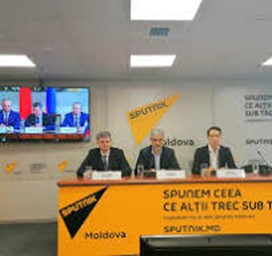
On the same day, the Commission for Emergency Situations decided to suspend the licenses of 6 TV channels “promoting foreign interests”: the TV channels Orizont TV, ITV, Prime, Publika TV, Canal 2 and Canal 3.
Prime Minister of Moldova Dorin Recean commented on his Facebook page “Moldova is subjected to hybrid attacks by the Russian Federation on a daily basis. In recent weeks, the intensity of such threats has increased. Russia, through organized crime groups, wants to influence local elections and undermine the democratic process. (…). These TV channels are subordinate to the criminal groups of Plahotniuc and Shor, who have joined their efforts aimed at destabilizing the situation in Moldova.”
In retaliation, Moscow announced to the Moldovan ambassador a ban on entry into the Russian Federation “for a number of officials of the Republic of Moldova”.
In conclusion, it is worth mentioning that in its World Press Index including 180 countries, Reporters Without Borders ranked Moldova in the following positions in the last three years: 89 in 2021, 40 in 2022 and 28 in 2023. In addition, Amnesty International, Human Rights Watch and the Committee for the Protection of Journalists considered in their last reports that freedom of the media in Moldova is not a relevant issue and does not deserve to be specifically covered.
About Evgeniya Gidulianova

Evgeniya Gidulianova holds a Ph.D. in Law and was Associate Professor at the Department of Criminal Procedure of Odesa Law Academy between 2006 and 2021.
She is now a lawyer in private practice and a consultant for the Brussels-based NGO Human Rights Without Frontiers.
(*) Ilan Shor is an Israel-born Moldovan oligarch and politician. In 2014, Shor “masterminded” a scam that saw US$1 billion disappear from Moldovan banks, resulting in a total loss equivalent to 12% of Moldova’s GDP and the arrest of former Prime Minister Vlad Filat. In June 2017, he was sentenced to 7.5 years of prison in absentia for fraud and money laundering and on 14 April 2023 his sentence was increased to 15 years. All of Shor’s Moldovan assets were also frozen. After spending time under house arrest he fled to Israel in 2019, where he currently lives.
On 26 October 2022, the United States sanctioned him due to his working with “corrupt oligarchs and Moscow-based entities to create political unrest in Moldova”.The UK and the EU also sanctioned Shor. His pro-Russian party, the ȘOR Party, was banned by the Constitutional Court of Moldova on 19 June 2023 after months of protests organized by his party. According to the court, these protests were designed to destabilize Moldova and foment a coup in order to install a pro-Russian government.
Politics
European Parliament begins its 10th term
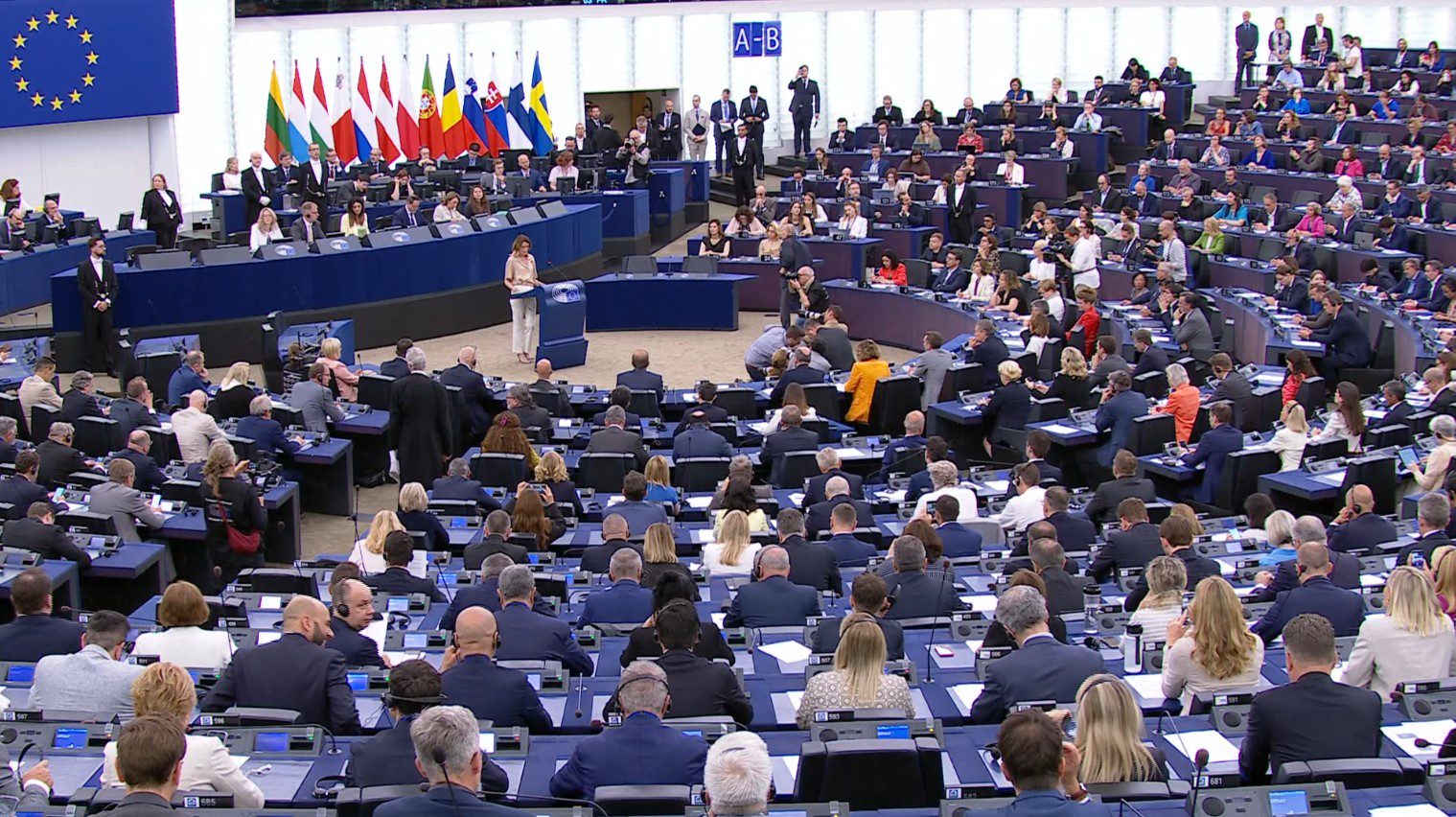
European Parliament Convenes in Strasbourg: New President to be Elected amid Growing Diversity
On a momentous Tuesday in Strasbourg, the European Parliament, following the recent European elections held on 6-9 June, officially commenced its proceedings. The session, presided over by the outgoing EP President, Roberta Metsola of the EPP from Malta, commenced with a musical interlude before Pina Picierno, the second Vice-President in the outgoing Parliament from Italy’s S&D, announced the contenders for the coveted Presidency of the Parliament.
The highly anticipated vote, conducted through a secret paper ballot, is set to occur immediately after the inaugural session. To ensure a fair process, eight MEPs, selected by lot, will oversee the election proceedings.
The distinguished candidates vying for the Presidency are Roberta Metsola representing EPP from Malta and Irene Montero from The Left in Spain. Ahead of the crucial vote, both candidates delivered succinct statements to the plenary, outlining their visions for the future of the European Parliament.
To attain victory, a candidate must secure an absolute majority of valid votes cast, which equates to 50% plus one. In the event of no clear winner in the initial round of voting, subsequent rounds may follow with the possibility of new or existing candidates being nominated under the same stipulations. If needed, a third round could ensue with the same regulations. Should no candidate emerge victorious after the third round, the two candidates with the highest votes in this round will advance to a decisive fourth and final round, with the majority winner emerging triumphant.
Upon the election of the new President, the distinguished individual will assume the leadership position and deliver a notable opening address, setting the tone for the parliamentary term ahead.
In this landmark tenth term, the European Parliament boasts 720 seats, an increase of 15 from the previous legislature. Notably, 54% of MEPs are fresh faces, marking a slight decrease from the 2019 intake of 61%, with the representation of women comprising 39%, down marginally from the 40% mark in 2019.
Among the diverse MEP cohort, Lena Schilling, a 23-year-old from Austria representing Greens/EFA, stands as the youngest member, while the seasoned Leoluca Orlando from Italy, a Green/EFA representative aged 77, holds the distinction of the oldest MEP. The average age of MEPs stands at 50, reflecting a diverse range of experiences and perspectives within the parliamentary body.
As the tenth term commences, the European Parliament encompasses eight political groups, an increase from the previous session. Additionally, 32 MEPs remain non-attached, underscoring the dynamic landscape of political affiliations within the Parliament and highlighting the vibrant tapestry of representation in the European legislative body.
Politics
For the first time in 40 years, the Olympics will not be broadcast in Russia
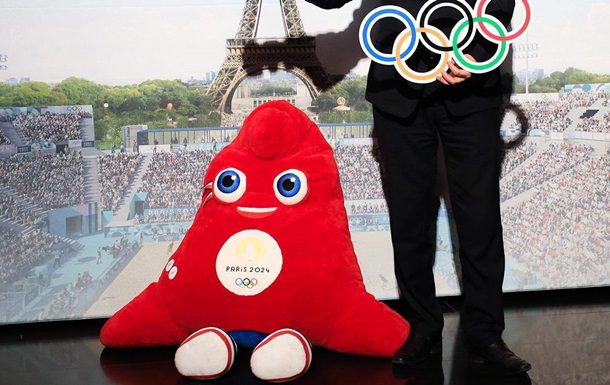
Not a single TV channel, streaming platform or cinema in Russia will show the competitions from the Summer Olympics in Paris, which begin on July 26, sports.ru writes. This happened for the first time in 40 years, when in 1984 the USSR boycotted the Olympics in Los Angeles.
The official explanation is that this time only 16 athletes will participate under a neutral flag, without an anthem and in “unpopular sports”. The unofficial thing is that this is a purely political decision of the Kremlin, and heads of federations call those who agreed to participate traitors, homeless people and foreign agents.
Paris Mayor on Russians at the 2024 Olympics: It would be better if they didn’t come
Anne Hidalgo condemned the International Olympic Committee’s decision regarding representatives of the aggressor country, she said already in March.
According to the official, it would be good if athletes from the terrorist country did not participate in international competitions.
“I prefer that they not come. We cannot act as if the invasion does not exist. We cannot act as if Putin is not a dictator who is threatening all of Europe today.”
At the same time, she added that such sanctions cannot be imposed against Israeli athletes, since Israel’s actions are different from Russia’s aggression.
“There can be no talk of imposing sanctions against Israel in connection with the Olympic and Paralympic Games. Because Israel is a democratic country,” the mayor told Reuters.
Photo: Social Network / korrespondent.net.
Politics
Keir Starmer Secures Historic Labour Victory, Ending 14 Years of Conservative Rule in UK
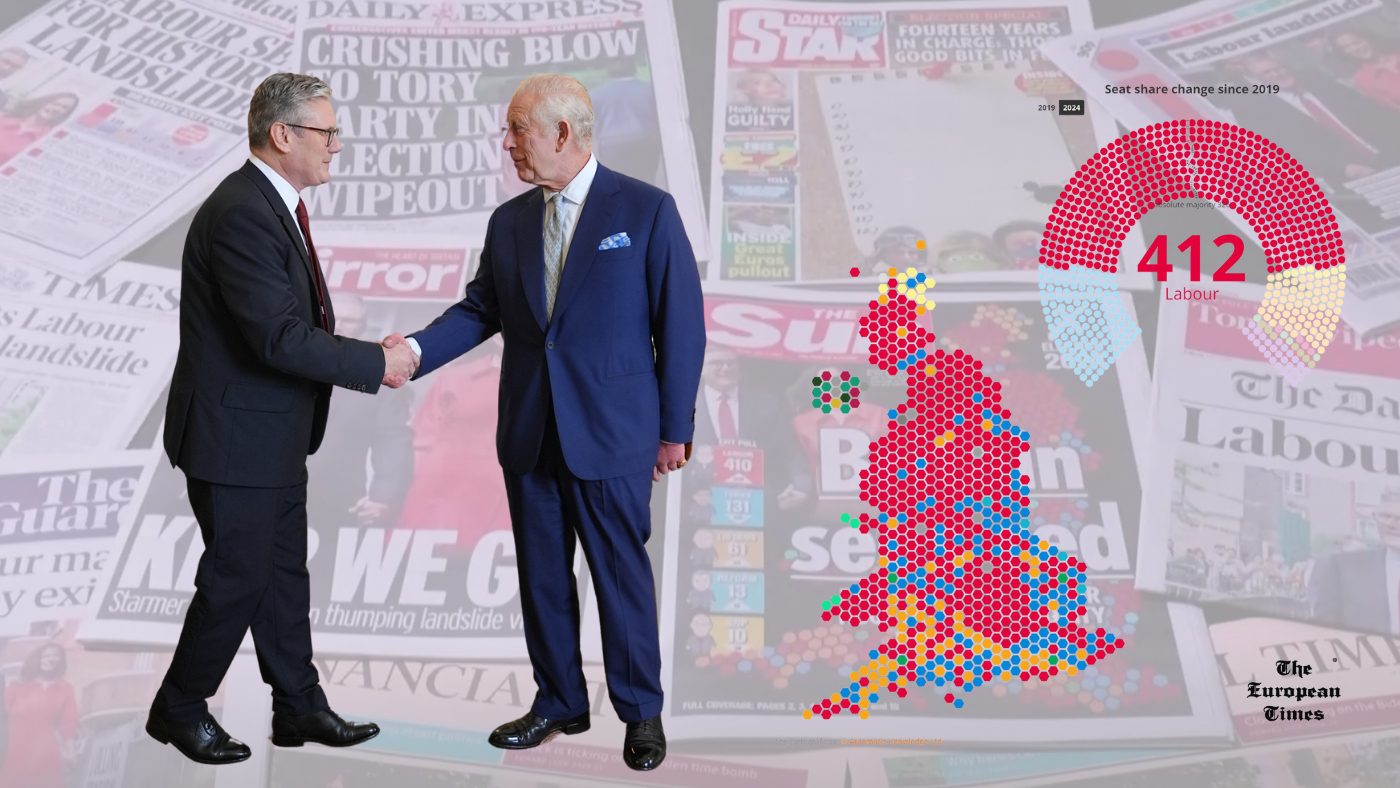
London – In a seismic shift in British politics, the Labour Party, led by Keir Starmer, has achieved a resounding victory in the UK general election, bringing an end to 14 years of Conservative governance. The results, which had been foreshadowed by months of polling, have given Labour its strongest parliamentary majority since 2001.
Labour secured an impressive 412 seats, far surpassing the 326 required for an absolute majority and more than doubling their 2019 performance. This landslide victory marks a dramatic turnaround for the party and signals a clear desire for change among the British electorate.
Upon learning of his victory in his central London constituency, Starmer declared, “The people have spoken, and they are ready for change.” This statement encapsulates the mood of a nation seemingly eager to embark on a new political chapter.

The Conservative Party, in stark contrast, suffered its worst defeat since its founding in 1834. The Tories lost at least 250 seats compared to their 2019 performance under Boris Johnson, ending up with a mere 121 seats. This historic collapse prompted the outgoing Prime Minister, Rishi Sunak, to apologize to “those Conservatives who have lost despite their dedication” while congratulating Starmer on his victory.
The election also saw significant shifts for other parties. The Liberal Democrats, led by Ed Davey, emerged as the third-largest party with 71 seats, a gain of 63 from the previous election. The Scottish National Party (SNP) experienced a dramatic decline, securing only nine seats, a loss of 38 compared to 2019. Sinn Fein, the Irish republican party, maintained its seven seats.

In a surprising development, the nationalist-populist Reform UK, led by Nigel Farage, entered Parliament with four seats, exceeding all poll predictions. The Green Party quadrupled its representation, winning four seats in total.
Starmer’s first address as Prime Minister was filled with promises of change and renewal. “We did it!” he exclaimed, emphasizing that Britons would wake up to find “a weight has finally been lifted from the shoulders of this great nation.” He stressed the urgency of rebuilding trust in politics and committed to serving all citizens, regardless of their voting preferences.
The new Prime Minister outlined his government’s priorities, including improving security on streets and borders, rebuilding infrastructure, and enhancing opportunities in education and employment. “Changing a country isn’t as easy as pressing a button,” Starmer cautioned, “We will rebuild the United Kingdom, brick by brick.”
Rishi Sunak, in his farewell speech, acknowledged the clear signal for change sent by the electorate. “I have heard your anger and disappointment. I take responsibility for these results,” he stated. Sunak announced his intention to step down as Conservative Party leader, but not immediately, allowing time for a formal process to choose his successor.
The election also marked a personal triumph for Nigel Farage, who finally won a parliamentary seat on his eighth attempt, representing Clacton-on-Sea. Farage hailed his party’s performance as “extraordinary” and vowed to fill what he sees as a “huge void in the center-right.”
In regional developments, Sinn Fein became the largest Northern Irish party in the British Parliament for the first time, maintaining its seven seats while the Democratic Unionist Party (DUP) fell to four. In Scotland, the SNP lost its dominance, dropping from 48 seats in 2019 to just 8, with Labour making significant gains. Wales saw the Conservatives lose all representation, with Labour dominating the results.
As the United Kingdom enters this new political era under Starmer’s leadership, the country faces significant challenges. The incoming government must address economic concerns, social policies, and perhaps most critically, work to restore public trust in the political system. The scale of Labour’s victory suggests a strong mandate for change, but the real test lies in translating this electoral success into effective governance in the years to come.
-

 Sports7 days ago
Sports7 days agoOfficial: Juventus announces sixth purchase
-

 Health & Society7 days ago
Health & Society7 days agoThe intoxicated society
-

 Politics5 days ago
Politics5 days agoThe Russian patriarch to Putin: You are the first truly Orthodox president
-

 Sports6 days ago
Sports6 days agoBeautiful Juve: Vlahovic and youth rout Verona. Thiago Motta first
-

 Sports6 days ago
Sports6 days agoJuventus, Vlahovic: “Now we play a different game.”
-

 Politics3 days ago
Politics3 days agoEU Intensifies Pressure: Six-Month Extension of Russia Sanctions
-

 Health & Society2 days ago
Health & Society2 days ago7 Superfoods That Will Boost Your Fitness Results
-
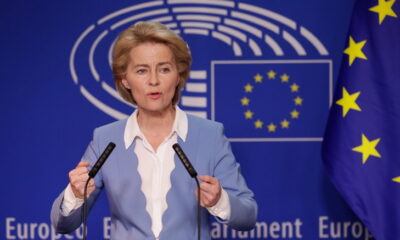
 Politics2 days ago
Politics2 days agoStatement by President von der Leyen at the joint press conference with President Metsola following the European Parliament Plenary vote








